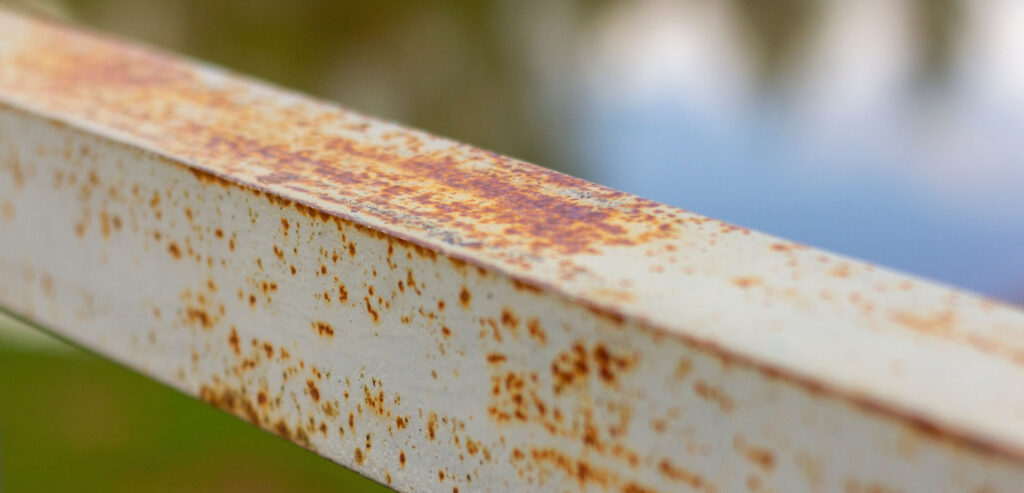
A perennial problem for experienced metallurgists, metalwork hobbyists and DIY-ers - metal corrosion cannot be reversed, but it can be avoided. Those familiar flaking surfaces and notorious patinas are telltale signs that metal corrosion has set in, but what exactly is it?
In short, metal corrosion is a natural chemical reaction that occurs when metal comes into contact with moisture and an oxidizer. Once all three of these factors are in place, the corrosion process is activated, causing the metal surfaces to break down and the resulting effects usually have visual and structural consequences. The most ubiquitous and recognisable form of metal corrosion is rust.
Once metal corrosion takes hold, it can have a terrible impact on the visual beauty of metal surfaces and even catestrophic outcomes in construction projects. Although metal corrosion is permanent, in many instances it can be avoided, if the right steps are followed.
In our latest blog, Austen Knapman will give you the best ways to prevent metal corrosion so you can help keep your metal creations both structurally sound and aesthetically appealing.
Choose The Right Metal Materials
Using metal materials with in-built corrosion resistant properties will be your strongest defence in the protection against rust and more insidious deterioration. Choosing stainless steel materials or shopping Austen Knapman's range of cut-to-size aluminium materials will ensure that you have the best possible recourse against the effects of long-term metal corrosion. Although there are many factors that cause metal corrosion, always start with great quality materials or bolster existing metals such as mild steel with a robust surface treatment - a method of prevention that will be explored later in this blog.
Limit Corrosion Exposure
Environmental factors also play a huge role in metal corrosion. The correct outdoor weather conditions can be the perfect storm for metal deterioration, with rain, salt water and general moisture-prone areas being the worst offenders. But it's not just outdoor exposure that can be a problem. Rust can also accumulate easily in hard water areas due to the high mineral content of the water. Before any project is undertaken, always consider what surroundings the metal will be situated in and whether the setting will be conducive to the materials you're using.
Apply A Suitable Coating
Sometimes certain metal materials, regardless of their suitability, have to be used for a particular project or application. To prevent corrosion in these situations, you can use a simple paint coating which will prevent moisture and oxygen reacting with the metal. It's also a very affordable and easy to apply form of barrier protection that's effective in the short to medium-term.
You can employ more sophisticated coatings such as powder coatings, galvanizing, anodizing and electroplating. Powder coating is probably the most convenient and accessible form of metal coating other than painting. Dry powders are heat-adhered to metal and can contain compounds and polymers such as acrylic and polyester as well as resins and the similar to provide metal protection.
Create An Anti-Corrosion Design
Well designed and conceived projects consider the strength and structural quality of the finished construction. They will outline the required materials, coatings and finishes to counteract and protect against rust damage - if metals are used expansively throughout the project. A well thought out building plan will be free of any design features or flaws that will act as a hotbed for rust accumulation and metal corrosion. Any areas on a metal structure that can trap moisture and sediment should be avoided and metal surfaces must always be easy to access for routine maintenance and replacement if necessary.
Use Sacrificial Coatings
Applying a protective metal coating intended to oxidise before the base metal underneath is referred to as a sacrificial coating. The most common sacrificial coatings are zinc or galvanisation on steel. Zinc, for example, is more active than steel so it will oxides as it corrodes which will prevent the underlying metal from corroding - this is referred to as Cathodic protection.
Other more robust sacrificial coatings include noble metals like tin which are less active. This means that it provides an unreactive veneer of protection against corrosion as long as the tin surface remains intact.
Once applied, sacrificial coatings will provide you with brilliant levels of metal protection that is invisible and therefore won't spoil the look of your metal surfaces. They're also quick and easy to apply and are largely environmentally friendly.